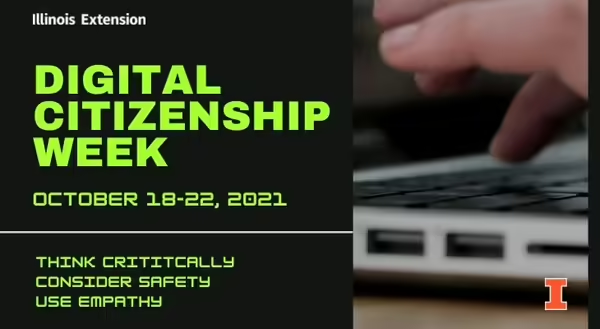
October 18-22 is Digital Citizenship Week! And if you’re anything like me, you might be wondering…
umm…so what?
Well, I think most of us would agree that it’s important to be good citizens IRL (that’s text speak for “in real life”). It’s important to be responsible, safe, and productive members of society. But often, our connected devices lure us into believing that, somehow, the internet isn’t real life. But it is! We’re all real people - and being online takes up a surprising amount of our real lives. So, we have to make sure that we’re good citizens even when we’re in the digital world.
But unfortunately, this isn’t easy. There are tons of factors (the sheer amount of information, the anonymity, the automation, and lots more!) that make it easy to forget how we should behave on our connected devices. So Digital Citizenship Week serves as a great reminder of the skills we may have forgotten (or never really had the chance to learn). Plus, it’s the perfect opportunity to teach these skills to our kids, too.
There are many ways we can be good digital citizens, but here are 3 easy ways you and your family can start:
Think Critically
Can you tell the difference between real news stories and fake ones? According to a study by Common Sense Media, 56% of kids can’t. But there’s SO much contradictory info out there, where do you start? Try jump starting your critical thinking skills with a few key questions:
- What website is this on, and what is its goal? If the site is trying to sell you something, or if it is funded by advertisers who want more people to see its ads, there’s a higher chance that stories will be hyped up to get more traffic. Look for websites that end in .org, .edu, or .gov for more reliable information.
- Who wrote this and what are their qualifications? Or does it even say who wrote it? Look for info about the author and find out if they have research, experience, or education to back up their claims.
- Are there other trustworthy sources saying the same thing? There’s a good reason your teachers always made you get three sources when you were writing a paper: there’s a better chance that the info’s true is several good sources are saying the same thing. (Hint: Use the first two questions to help determine trustworthiness – that’s important.)
Check out this great article on media literacy for more ways to be responsible consumers of media
Consider Safety
We all know that about important ways to stay safe online, like using strong passwords, and looking out for scams. But when it comes to digital citizenship, we have to think about emotional safety, too. Talk to your kids about the need for balance between screen time and the other activities and people in their lives. Help them to understand what healthy relationships look, and that they are defined by more than the number of people that liked their most recent social media post. Also be conscious of the examples you’re setting with how you interact with digital spaces. This Digital Citizenship Guide for Parents and these Family Media Contracts can help provide some practical ways to do this. And if you’re looking for ways to better connect with your family in-person, be sure to check out our Family Connection Kits.
Use Empathy
The internet can be a pretty cruel place. According to a recent webinar from Casel and Common Sense Education, 40% of kids have been involved in a cyberbullying incident, and 45% of kids have seen hate speech online. Plus, encounters with racist, sexist, and homophobic hate speech have all risen since 2018. As we discussed above, it’s important to protect yourself and your family from the effects of these cruelties. But it is equally important to be sure we aren’t contributing to them. As digital citizens, we need to interact in digital spaces with respect, compassion, and empathy. Practice showing kindness with your family, and talk about how those attitudes should be extended to all spaces, digital or in-person.
Excited to know more? Here are some resources to help.
- Common Sense Media
- Media Smarts
- International Society for Technology Education
- Digital Technologies Hub
- Edutopia - Digital Citizenship: Resource Roundup
MEET THE AUTHOR
Emily Schoenfelder joined the Illinois 4-H team in 2017. Prior to this, she began her work in positive youth development with California 4-H and the YMCA. She specializes in STEM engagement, social-emotional development, and educator professional development. She received a Master of Science degree in recreation, park, and tourism administration from Western Illinois University. When she is not leading a training, writing curriculum, or developing new partnerships, you may find Emily sitting on the floor of her office, building marshmallow catapults out of popsicle sticks or designing mazes for robots for her next STEM program.
ABOUT THE BLOG
Connection Corner is a blog that provides timely information, activities, and resources to help you stay connected to loved ones, the world around you, and yourself.